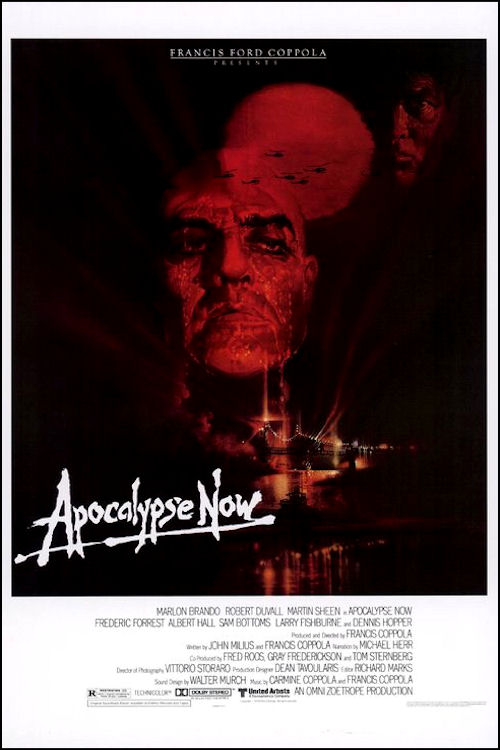Anthony's Film Review
Apocalypse Now (1979)

Francis Ford Coppola's war epic is undoubtedly a cinematic classic...
War is ugly. No matter which war it is, there is only horror and pain for those involved. Even so, there is one war that Americans definitely remember because of the number of people who died and the fiery debate over its purpose: the Vietnam War. It's especially painful to remember that some Americans were drafted into that war, basically being forced to go overseas against their will. Naturally, many who served didn't want to be there, and their fears of death only skyrocketed once they faced the threat of it in the battlefield. Anyone who survived that ordeal might come home with painful physical and emotional scars.
As with any major war, the Vietnam War provides great material for fiction in war movies. Francis Ford Coppola was certainly aware of this, which led him to direct the 1979 Vietnam War epic Apocalypse Now. Interestingly, he decided to incorporate core elements from other stories into this movie, namely Joseph Conrad's classic novella Heart of Darkness. The result is a story that portrays the war itself and presents a deeper look into the human soul. (Note: If you haven't read Heart of Darkness, don't worry. I'll fill you in on the similarities between that story and Apocalypse Now.)
The beginning of Apocalypse Now is quite effective. The opening shots consist of bombs going off in a jungle, to the tune of "The End" by The Doors. After that, we meet the film's main character: Captain Willard (Martin Sheen). He is a man who knows the horrors of war all too well, which you can tell by the tone of his voiceover narration heard throughout the movie. It is this character who is given a rather interesting mission: locate the rogue Colonel Kurtz, who was once a brilliant American army officer but has now gone insane. But Willard isn't just ordered to find Kurtz. He is also ordered to execute Kurtz for murder. As one other character puts it, the objective is to "terminate with extreme prejudice." (In Heart of Darkness, the English sailor Marlow searches for a crazed ivory trader named Kurtz in the jungles of Africa. This movie essentially changes the African setting to Vietnam, English colonialism to American warfare, Marlow to an army captain named Willard, and Kurtz to an insane colonel.)
What's amazing about this war movie is how Francis Ford Coppola creates different kinds of scenes to capture the different aspects and emotions of war. For example, there is a great scene where American helicopters attack a Vietnamese village with a combination of missiles and machine guns. The brutality of this offensive is given a dose of excitement as Richard Wagner's "Ride of the Valkyries" is played during the battle. Later, Willard and his team head down a river when things feel calmer under the dark of night, although one character goes into a panic because of homesickness. After that, there's a scene where Playboy Playmates put on a show to boost the morale of the troops.
Still, the real heart of the movie is the journey into darkness (obviously, many core elements of Heart of Darkness appear late in the movie). Willard heads further along the river while examining photographs and documents pertaining to Kurtz and understanding the man's state of mind. There is a great sense of anticipation and suspense as Willard is much closer to his target, especially as the jungle setting appears darker and his boat gets attacked by arrows (just like in Heart of Darkness). Once Willard finally arrives at Kurtz's compound in Cambodia, what he sees is quite astonishing. At last, Kurtz appears on screen, played by Marlon Brando in a performance that stays with us, even as it is brief and late in the film. Kurtz is made especially intriguing because he is seen on screen mostly concealed by shadow.
I have to admit. I never expected a combination of a Vietnam War story and a classic story known for its deep symbolism of human nature. But it works very well, because the two feed off each other. Aside from that, Apocalypse Now is an excellent film because of the performances, particularly with Martin Sheen and Marlon Brando, and because of the visually stunning cinematography and honest presentation of human flaws in a war setting. Plus, you gotta love the memorable quotes of Robert Duvall's character Lieutenant Colonel Bill Kilgore ("I love the smell of napalm in the morning.") and Kurtz ("The horror... the horror..." which is from Heart of Darkness). It is said that Francis Ford Coppola spent countless hours editing miles of footage and that some major problems plagued the filming, like a typhoon destroying sets. Looking at the finished product, I would say that the troubles they went through and the effort they put it were all worth it. Apocalypse Now is undoubtedly a cinematic classic.
Anthony's Rating:










For more information about Apocalypse Now, visit the Internet Movie Database.
Home
Film Reviews
Other Reviews
Commentaries
Links
About AFR
RSS Feed
Privacy Policy
E-mail Anthony











